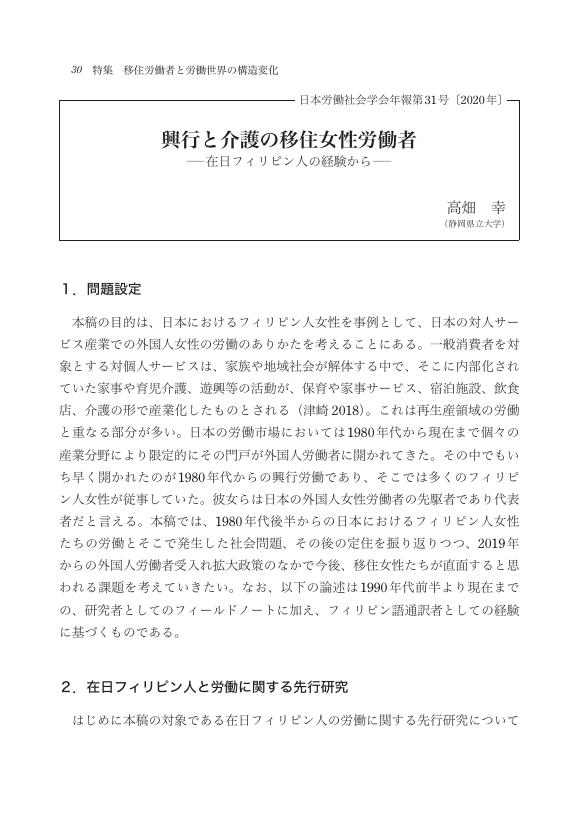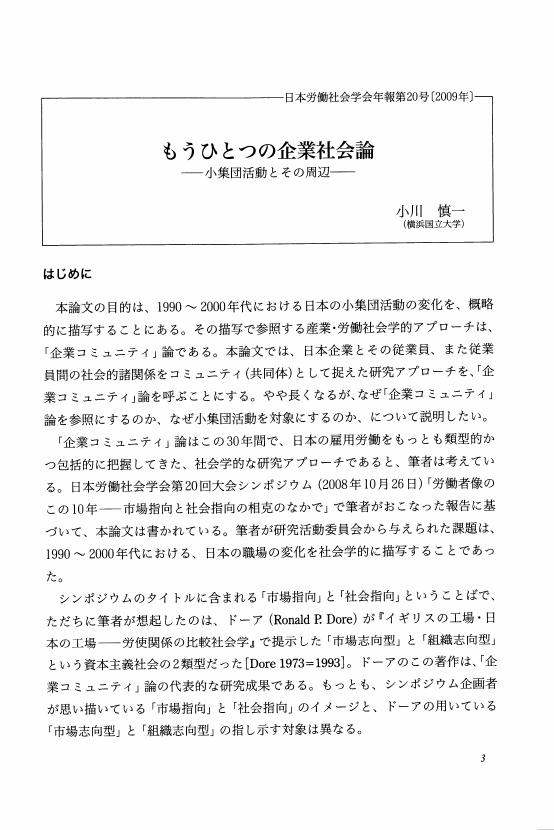7 0 0 0 OA ポスト工業社会における労働者の共同性と個人契機の記述 河西宏祐の「労働者文化」論の可能性
- 著者
- 松永 伸太朗 永田 大輔
- 出版者
- 日本労働社会学会
- 雑誌
- 日本労働社会学会年報 (ISSN:09197990)
- 巻号頁・発行日
- vol.30, pp.89-113, 2019 (Released:2021-05-14)
- 参考文献数
- 39
6 0 0 0 OA 第一次資料の調査・収集に関わり続けて
- 著者
- 田中 直樹
- 出版者
- 日本労働社会学会
- 雑誌
- 日本労働社会学会年報 (ISSN:09197990)
- 巻号頁・発行日
- vol.11, pp.35-43, 2000 (Released:2020-11-20)
6 0 0 0 OA 「引越屋」の労働世界 非正規雇用で働く若者の自己規定
- 著者
- 山根 清宏
- 出版者
- 日本労働社会学会
- 雑誌
- 日本労働社会学会年報 (ISSN:09197990)
- 巻号頁・発行日
- vol.15, pp.59-81, 2005 (Released:2020-11-20)
- 参考文献数
- 22
The aim of this paper is to investigate the youth labor process of temporary jobs and to explain factors to prevent a transition from temporary jobs-“freeter” to permanent jobs- “seisyain” in the case of “Movers” in Yokohama city. In particular, this investigation is focused on a social norm, a manner of action and a peer group. Young men in temporary jobs have a manner of action in connection to a social norm and a status of temporary jobs and have a peer group in a labor process. Temporary jobs are located in a differential status from permanent jobs. And young men in temporary jobs are understood as a deviance from a social norm. Accordingly their experiences in temporary jobs and against a social norm bring them a manner of action in a labor process. In this case, that is a differentiation against old men and inexperience men in same temporary job, and is a opposition to regulations in an office and men in a permanent employment-“seisyain”. And through their unique actions they become absorbed in jobs more and more. But, when they have an intention to get permanent jobs-“seisyain” by reason of an unstable employment, they can't get it smoothly. A manner of action and a peer group prevent them from getting it. For them this is an unexpected result. In this case, factors to prevent a transition from temporary jobs-“freeter”are brought by not only changes of labor markets or a lack of vocational trainings but also a manner of action and a peer group which is an adaptation to temporary jobs.
3 0 0 0 OA 格差社会に立ち向かう地域労働運動 個人加盟ユニオンの取り組みを中心に
- 著者
- 呉 学殊
- 出版者
- 日本労働社会学会
- 雑誌
- 日本労働社会学会年報 (ISSN:09197990)
- 巻号頁・発行日
- vol.24, pp.19-36, 2013 (Released:2020-09-01)
- 参考文献数
- 20
2 0 0 0 OA 上海の大衆寿司店におけるローカル化と「寿司職人」の成立及びその役割
- 著者
- 王 昊天
- 出版者
- 日本労働社会学会
- 雑誌
- 日本労働社会学会年報 (ISSN:09197990)
- 巻号頁・発行日
- vol.27, pp.132-158, 2016 (Released:2018-01-31)
- 参考文献数
- 11
2 0 0 0 河西宏祐著『全契約社員の正社員化を実現した労働 組合』
- 著者
- 野瀬 正治
- 出版者
- 日本労働社会学会
- 雑誌
- 日本労働社会学会年報 (ISSN:09197990)
- 巻号頁・発行日
- vol.26, pp.188-192, 2015
- 著者
- 嵯峨 一郎
- 出版者
- 日本労働社会学会
- 雑誌
- 日本労働社会学会年報 (ISSN:09197990)
- 巻号頁・発行日
- vol.23, pp.145-149, 2012
2 0 0 0 公的部門における感情労働--生活保護ケースワーカーを事例に
- 著者
- 小村 由香
- 出版者
- 日本労働社会学会
- 雑誌
- 日本労働社会学会年報 (ISSN:09197990)
- 巻号頁・発行日
- no.19, pp.63-81[含 英語文要旨], 2009
- 被引用文献数
- 1
1 0 0 0 OA 「東京管理職ユニオン」組合員の意識変容
- 著者
- 小谷 幸
- 出版者
- 日本労働社会学会
- 雑誌
- 日本労働社会学会年報 (ISSN:09197990)
- 巻号頁・発行日
- vol.12, pp.147-178, 2001 (Released:2020-11-20)
- 参考文献数
- 31
- 被引用文献数
- 1
Japanese society has been characterized as “company-orientated” society. But it begins to be reconsidered owing to confronting white-collar dismissals. As a result of the situation like this, Tokyo Managers' Union was established in 1993. The dismissed white-collar managers and workers join the union to solve their problems. This has a tendency to form the anti-company orientated character. This paper, which reports the research consisting of the interview with fifty one members of Tokyo Managers' Union, has two main purposes. One is to show Tokyo Managers' Union as a labor union and its activities. The other is to demonstrate the member's alteration of consciousness that affects the connection with “company-orientated” society. In the paper, “company-orientated” society means the society where companies have control over their employee's entire life. First, this paper reveals that the philosophy and action policy of Tokyo Managers' Union are opposed to the system of “company-orientated” society to suppress labor union and workers. The leaders of Tokyo Managers' Union not only place emphasis on fulfilling the demands of workers throughout the consultations, but also try to profit from supporting individual initiatives of them through the mutual cooperation among the members; therefore the union has anti-bureaucratic tendencies and emphasizes the independence of union members. Second, the paper also gives an account of the member's alteration of consciousness. Most of the people of Tokyo Managers' Union have had a sense of loss on labor problems, a need-disposition like financial compensation, and a sense of morality to set their company’s unreasoning act right as initial motivation. They have cultivated the anti-company orientated consciousness, which set a higher value of the responsibility of self-determination and the equivalent relation, through the union's problem-solving activities. Some members leave the union after settling their problem. The others who have strongly the consciousness still stay and support the activities of the union for a prolonged period. This alteration of consciousness can be evaluated as the valuable attempts to redefine “company-orientated” society. Also, it is the future subject for me to determine the position of this survey in theoretical labor union researches.
1 0 0 0 OA 「女性活躍社会」の下での母子家庭の母の労働と生活 強制される就労と貧困
- 著者
- 中囿 桐代
- 出版者
- 日本労働社会学会
- 雑誌
- 日本労働社会学会年報 (ISSN:09197990)
- 巻号頁・発行日
- vol.27, pp.80-103, 2016 (Released:2018-01-31)
- 参考文献数
- 24
1 0 0 0 OA 興行と介護の移住女性労働者 在日フィリピン人の経験から
- 著者
- 高畑 幸
- 出版者
- 日本労働社会学会
- 雑誌
- 日本労働社会学会年報 (ISSN:09197990)
- 巻号頁・発行日
- vol.31, pp.30, 2020 (Released:2021-12-28)
- 参考文献数
- 21
1 0 0 0 OA 人口減少問題と企業社会
- 著者
- 木下 武男
- 出版者
- 日本労働社会学会
- 雑誌
- 日本労働社会学会年報 (ISSN:09197990)
- 巻号頁・発行日
- vol.28, pp.8-37, 2017 (Released:2021-05-14)
- 参考文献数
- 11
1 0 0 0 OA 農業における外国人技能実習生の受入実態と地域的課題 北海道を事例に
- 著者
- 宮入 隆
- 出版者
- 日本労働社会学会
- 雑誌
- 日本労働社会学会年報 (ISSN:09197990)
- 巻号頁・発行日
- vol.31, pp.58, 2020 (Released:2021-12-28)
- 参考文献数
- 21
- 被引用文献数
- 2
1 0 0 0 OA 日本型企業社会と管理教育・労務管理 トヨタ「企業城下町」を事例として
- 著者
- 猿田 正機
- 出版者
- 日本労働社会学会
- 雑誌
- 日本労働社会学会年報 (ISSN:09197990)
- 巻号頁・発行日
- vol.7, pp.27-52, 1996 (Released:2020-11-20)
1 0 0 0 OA 女性ユニオンのめざすもの
- 著者
- 伊藤 みどり
- 出版者
- 日本労働社会学会
- 雑誌
- 日本労働社会学会年報 (ISSN:09197990)
- 巻号頁・発行日
- vol.9, pp.41-49, 1998 (Released:2020-11-20)
1 0 0 0 OA 『出稼ぎ』研究の理論的前提 当事者の論理と社会的性格の検討を通じて
- 著者
- 矢野 晋吾
- 出版者
- 日本労働社会学会
- 雑誌
- 日本労働社会学会年報 (ISSN:09197990)
- 巻号頁・発行日
- vol.11, pp.63-89, 2000 (Released:2020-11-20)
- 参考文献数
- 52
This essay aims to re-examine Japanese “Dekasegi” labour migration and to point out a new framework for case-studies. “Dekasegi” workers leave their villages to earn income for a temporary period. In preceding studies, the term has been applied to several different types of labour migration without clearly addressing certain important points in the respective definitions. Among these are the “attitude” and “behaviour” of the workers and the “term” for which workers are away from their homes. In this essay, “Dekasegi” will be re-defined from the viewpoint of workers’ subjective logic. Then, “Dekasegi” apart from daily labour migration, will be classified into 1) modern labour’s type of “Dekasegi” and 2) the traditional type of “Dekasegi”. These two types mainly differ in two social characters, the relation of 1) the social structure of the village and 2) the management of the “ie”, or household.
1 0 0 0 OA 熊沢誠著『働きすぎに斃れて -過労死・過労自殺の語る労働史』
- 著者
- 嵯峨 一郎
- 出版者
- 日本労働社会学会
- 雑誌
- 日本労働社会学会年報 (ISSN:09197990)
- 巻号頁・発行日
- vol.21, pp.123-129, 2010 (Released:2020-09-01)
1 0 0 0 OA もうひとつの企業社会論 小集団運動とその周辺
- 著者
- 小川 慎一
- 出版者
- 日本労働社会学会
- 雑誌
- 日本労働社会学会年報 (ISSN:09197990)
- 巻号頁・発行日
- vol.20, pp.3-27, 2009 (Released:2020-09-01)
- 参考文献数
- 59
1 0 0 0 OA 介護保険10年の検証と介護労働問題
- 著者
- 伊藤 周平
- 出版者
- 日本労働社会学会
- 雑誌
- 日本労働社会学会年報 (ISSN:09197990)
- 巻号頁・発行日
- vol.21, pp.3-21, 2010 (Released:2020-09-01)
1 0 0 0 中嶌剛著『とりあえず志向とキャリア形成』
- 著者
- 橋口 昌治
- 出版者
- 日本労働社会学会
- 雑誌
- 日本労働社会学会年報 (ISSN:09197990)
- 巻号頁・発行日
- vol.27, pp.172-176, 2016











